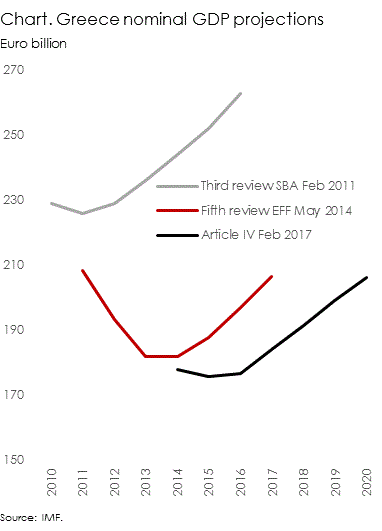Greece's shrinking
17 February 2017
The International Monetary Fund (IMF) and European Union (EU) quarrel once again about the sustainability of Greece’s government debt. Debt should not be the focus. The latest IMF Article IV consultation on Greece published on 7 February illustrates the considerable shrinking of the Greek economy. Naturally, an economy that represents less than 70 percent in size in 2016 than it was originally projected to be must attract a comprehensive rethink of how to tackle its problems. Greece needs a completely new approach. This will most certainly require more debt relief from private and official creditors.
The fundamental problem of Greece is that the Greek economy has performed significantly poorer than it was projected to perform. Greece’s GDP in 2016 is euro 177 billion. This compares to euro 231 billion in 2010 when the first request for stand-by arrangement was made and to euro 263 billion that the Greek economy was projected to reach in 2016 under the third review of the stand-by arrangement in February 2011.1 The persistent under-estimation of the Greek economy’s difficulties must have led to wrong policy recommendations and expectations (Chart). Unless due account is taken that Greece today is a very different place than in 2010, it will be impossible to find the right solution for Greece.
The IMF and EU continue their well-rehearsed unfortunate public battle on the prior conditions that would make the Fund continue to support the Greek economic programme. The Fund insists on up-front debt relief and the EU insists that no debt relief is needed. Both are right.
It is of course not the level of debt that matters but the cost to service and refinance it. Greece’s government debt interest payments today are relatively low at around 3.0-3.5 percent of GDP. The bulk of Greece’s government debt is held by the EU. The EU already provides generous debt relief amid the favourable terms extended to Greece. If the EU further commits to maintain very low debt service costs and to refinance its holdings of Greek government debt due then Greece naturally does not face a debt sustainability and adjustment problem regardless of the level of its debt. However, this holds only if and only if the EU issues a convincing commitment to permanently support Greece.
The shrinking of the economy is the only relevant problem for Greece. As such the country will not be able to sustain under normal circumstances its obligations vis-à-vis its creditors or its citizens. More radical thinking than a debate about the primary surplus or debt level is needed to identify a credible plan for Greece. Nothwithstanding, private sector bondholders and official bi-lateral and regional creditors will also need to offer more debt relief.

1 Independent Evaluation Office, 2016 (http://www.ieo-imf.org/ieo/pages/EvaluationImages267.aspx) highlighted that the IMF was unduly optimistic in its economic projections under the Greek economic stand-by arrangement.